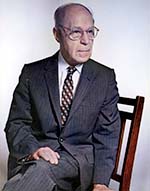About Hermann J. Muller
Born in New York, December 21, 1890, Hermann J. Muller's interest in nature, and the sciences began at an early age; while attending public high school in the Bronx, Hermann and a few classmates founded the first ever high school science club. Though not well-established financially, Hermann was provided with the opportunity to attend Columbia through the Cooper-Hewitt scholarship award. During his first year in college, he realized he was thoroughly fascinated by the subject of biology. He spent his summers reading various books on genetics and focused his interest on that field specifically. Further courses on experimental biology and physiology continued to influence him and he founded a students' biology club. Advancing to graduate work, Hermann was able to obtain a scholarship and a teaching fellowship in physiology, the latter at Cornell Medical College, as the field of zoology, his initial preference, lacked any openings. After two years, however, he received a teaching assistantship in zoology and continued his studies at Columbia.
His teaching and laboratory work kept him so busy that Hermann did not have an opportunity to begin his own experimental work for a year or two. Finally, he was finally able to research the simultaneous inter-relationship of many linked genes, which supported the theory of crossing-over and eventually constituted his thesis. He continued to analyze variable, multiple-factor characters, and confirmed the validity of both chromosomal inheritance and gene stability. Hermann was then offered a position as Instructor at the Rice Institute in Houston, where he taught biological courses and studies on mutation. Returning to Columbia encouraged him to elaborate methods for quantitative mutation study, resulting in early evidence that made an effect of temperature highly probable. Back to Texas, this time to the University of Austin, Hermann was an associate professor and continued his teaching and research. During the next five years, he formulated what we now recognize as chief principles of spontaneous gene mutation. These include the detrimental and recessive quality of mutations, and that mutations are physic-chemical accidents made from random molecular motions.
His most essential research was obtained through critical evidence of the abundant production of gene mutations and chromosome changes by X-rays; more specifically, the discovery of the production of mutations by means of X-ray irradiation. Numerous other scientists and researchers were able to expand on this evidence in the twenty years that followed, including studies on the mechanisms of the gene mutation effects and the structural changes, the roles that said changes then played in evolution, and on the properties of genes and of chromosome parts. This research, combined with the first discovery of such an effect, is what constituted the work for which he was awarded the Nobel Prize in Physiology or Medicine in 1946. Just before receiving this award, Hermann accepted a full professorship in the Zoology department at Indiana University, where he devoted much of his time to work on radiation-induced mutations, studying how the radiation produces its biological effects. His leadership at IU in the study of the genetics of fruit flies (and understanding fruit flies in detail, understanding genetics of all animals - humans included) produced incredible results in the progression of the field of genetic analysis.


